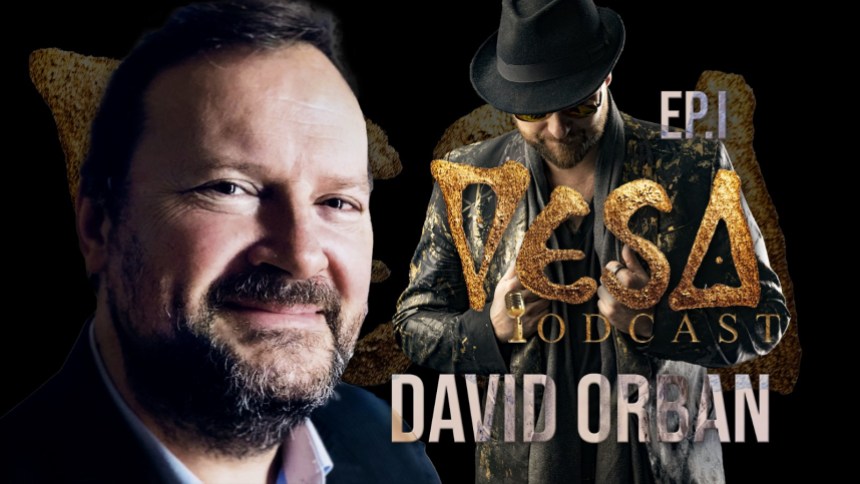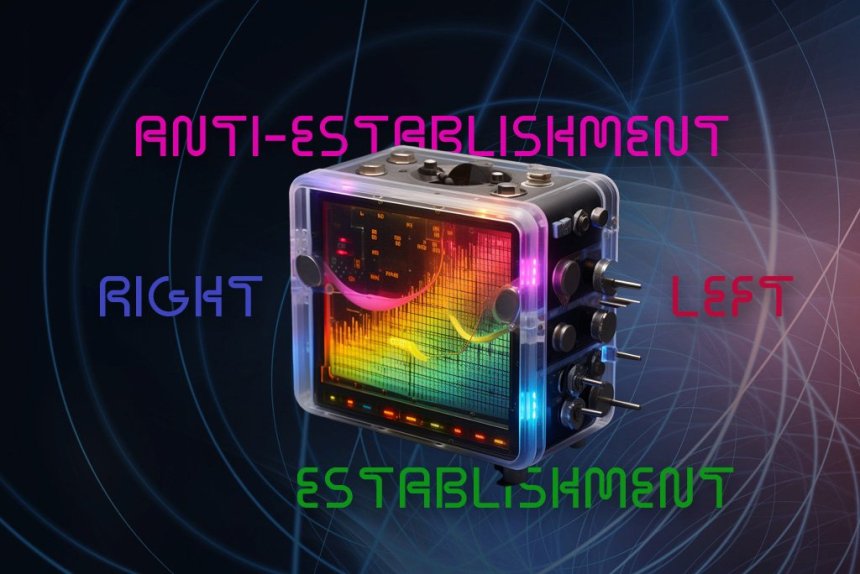Today we’re taking a look at an important first. It is the start of the VESA Podcast, and as the first guest, we meet David Orban, who was generous with his time to record this conversation. A previous iteration of a podcast was already started in 2017, with some notable guests like Charlie Lee, but now the time was right for a rebrand and a jump up to speed on connecting with people in the scene.
 It was also a blessing in disguise that the zoom recording of this podcast was recorded on zoom, and VESA erroneously remembered that the recording quality is HD, which it wasn’t. Luckily the upscaling of the 360p video with AI came to make it a crisp 4K, even if the titles of the books are washed out.
It was also a blessing in disguise that the zoom recording of this podcast was recorded on zoom, and VESA erroneously remembered that the recording quality is HD, which it wasn’t. Luckily the upscaling of the 360p video with AI came to make it a crisp 4K, even if the titles of the books are washed out.
New Podcast
David is an investor, entrepreneur, author, keynote speaker, and thought leader of the global technology landscape. His entrepreneurial accomplishments span several companies founded and grown over more than twenty years. VESA and David first met in Dubai during VESA’s exhibition at the Dubai Mall. Their initial conversation spanned over many in depth topics, touching on the ever changing technology space, entrepreneurship, AI and ethics, and what the future holds for the scene itself. This is an interpretative summary of David’s appearance on the VESA Podcast recently and what that conversation looked like.
To listen to the entire episode on the VESA Podcast on You Tube, click here:
Listen on Spotify
Listen on Youtube
David joins the podcast from his home in Northern Italy, where he feels comfortable surrounded by his impressive library of books and high quality Italian food.
As a starting point, VESA dove into David’s view on his inner science, as he knew based on their previous conversation that David had completed a Vipassana, or a silent retreat. Complete silence with no technology, or any kind of entertainment or study material might seem counterintuitive for a technologist, but David credited the retreat as hugely impactful and positive.
– It is actually not easy, David says.
He describes the amount of discipline it requires to completely withdraw to a world without electronics, books, newspapers or even eye contact with other people. The discipline was self-administered, understanding the benefits of the practice.
He adds that the recommendation is to meditate one to two hours a day after completing the retreat, but that he hasn’t applied this yet to his daily routine.
The conversation then turns to the opposite end of the spectrum, a world of total electronic or machine integration. How far down the pike are we? Will we even realize, when the chip is installed, or has it indeed already been installed years ago due to our association with technology?

David offers that everything we experience can be dissected on the objective-subjective axis, and further by taking into consideration time and place. What is a subjective experience with little to no relevance to others, versus timeless truths will depend greatly on how the information is curated and presented. Technology as we know it is deeply entwined with the time and place aspect. Technology socializes us and points us in the direction of necessary skills and behaviours. This influence has to be modulated, he states.
MMA of Religion
VESA then wants to present an idea to David that he has been developing in his mind for a little while. The concept pertains to the evolution of religion and what the next step could look like in what could arguably be called a post-Christian world. He suggests that there could emerge an amalgam of religions that takes traditions from different faiths, an MMA (Mixed Martial Arts) of religion, as he calls it.
– I recommend people be immodest, but humble, David starts as he describes a person capable of connecting the dots across different fields and from various sources of authority.
– Many are uncomfortable in accepting revealed religions as the answer to essential questions, but as I saw after the collapse of the Berlin wall, people have a need for religious experiences and I respect that, so I feel an evolution to bridge that gap might very well be underway.
 In many ways you have to regress 200 years in order to resonate with the current church paradigm of wooden long benches and hymns.
In many ways you have to regress 200 years in order to resonate with the current church paradigm of wooden long benches and hymns.
VESA notes that a similar ‘religious’ belief surfacing from different fields is the idea that we live in a simulation. This, he says, brings about an attitude which paired with rapidly evolving AI might lead to a pathologically Godless society, lacking spiritual nourishment and transcendence.
The perplexing phenomenon of our time is that at the same time we have the most advanced non-biological technology and the demand to return to being the centre of the universe, so to speak.
Do we live in a simulation?

Inspired by his revelations with his new AI Series Juxtaposers, VESA presents an idea that in the current cultural context of left vs right, what seems to be missing is differentiation between establishment and anti-establishment, and how some times these labels can flip on their heads simply because of provoking thought, as in the case of Russel Brandt, who is now seen as a right-wing person simply because he has vocalized anti-establishment views. This axiom is at the heart of the Juxtaposers- series, which includes polarizing figures like Andrew Tate, Ben Shapiro, AOC and more.
– If you think about it, the Amish are more anti-establishment than most, it’s just a low dopamine ride, he explains as to why he wanted to draw parallels between Andrew Tate as an Amish apple picker.
As a segway to another cultural context, VESA tells that he had mixed feelings about a video he viewed with Sam Altman and Android Jones discussing AI. To him, Android’s very name and his fervent opposition to AI was in stark contrast.
– In times gone past, we used to organize ourselves in guilds as a way to control who has the right to express certain trades. Now, perhaps for the first time, we have the opportunity to open the arts for everyone, David says.
– The current situation is a dam about to burst. The label ‘artist’ is open to everyone and we will devise new metrics of value as a result, he explains.
Listen on Youtube VESA gives an example of him commissioning a rap song via AI that was purely produced as a soundtrack for him painting in his studio, and how not even the most indulgent king would have dreamed of doing something like that before.
VESA gives an example of him commissioning a rap song via AI that was purely produced as a soundtrack for him painting in his studio, and how not even the most indulgent king would have dreamed of doing something like that before.

Actioneer
Next, VESA wants to learn more about David’s company Actioneer. He offers himself up as an example of someone who is masterful at their craft and quite observant, but hesitates in fulfilling a role of a CEO or a COO in a company setting, which modern day artists need to consider. What can a company like Actioneer do for artists and others who find themselves in a similar position?
– The world is so complex that we need all the help we can get. AI can help us decode our questions better than ever before, as we look into a paradigm where the old system of educating, gaining a job, working and dying is being challenged, David says.
– The spearhead of this are the founders of startups, and the entrepreneurial spirit is what Actioneer supports. To a select few this has been available for a while through incubators and mentorships, and Actioneer can democratize this help and make it very abundant, he explains.
– We believe that the world will be as saturated with tools like Actioneer, as it is presently with access to the Internet, because they are such an integral part of our modern lives, he says.
VESA sums up the necessity of these tools by noting that if you don’t become an entrepreneur as an artist, you won’t be an artist for long.
To follow David Orban’s message, you can find him at:
David Orban Dot Com
All socials etc
______
Until next time,
VESA & Lotta
Crypto & NFT Artist
All links to physical, NFTs, and more below
http://linktr.ee/ArtByVesa






 (@shillingbears) February 8, 2022
(@shillingbears) February 8, 2022




